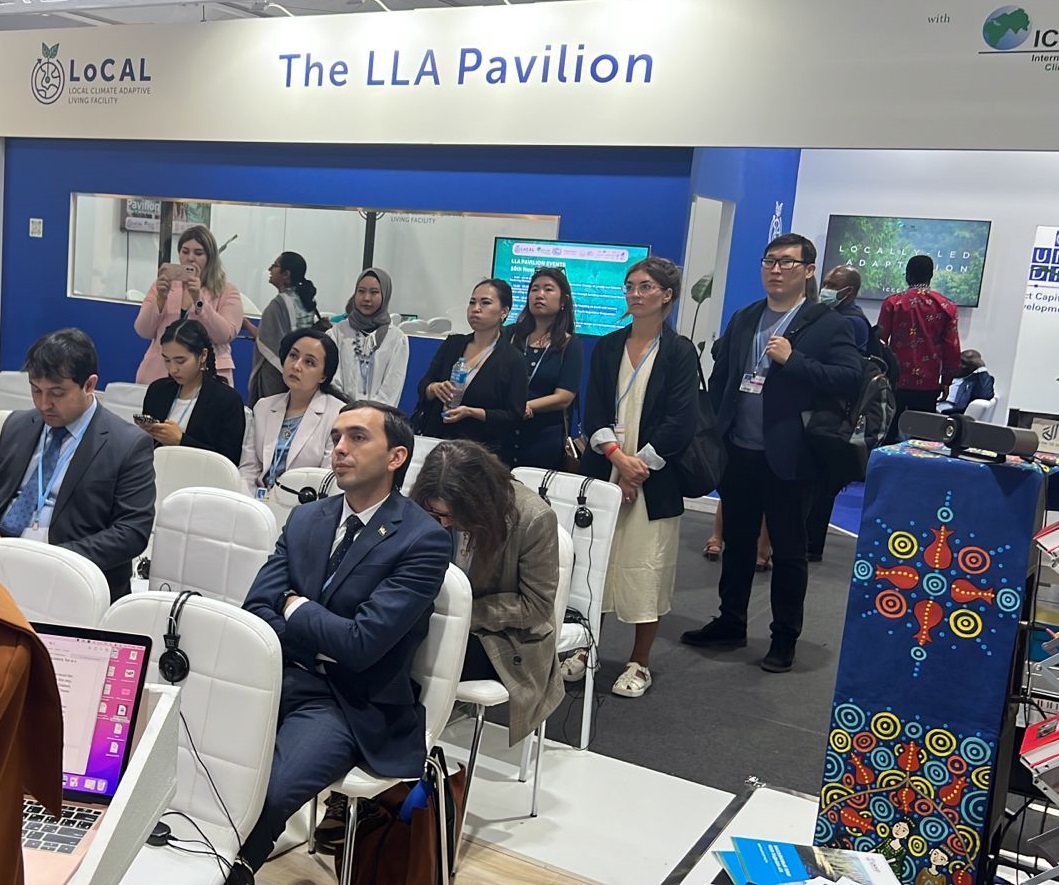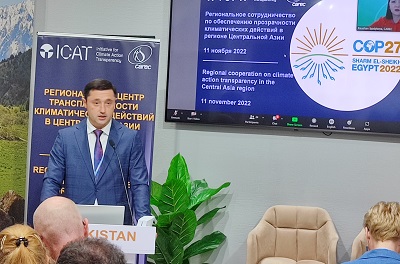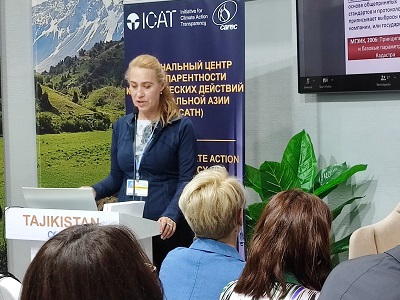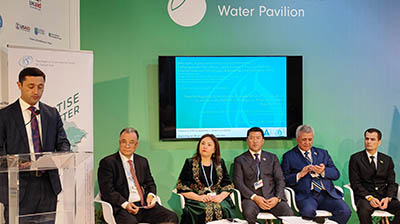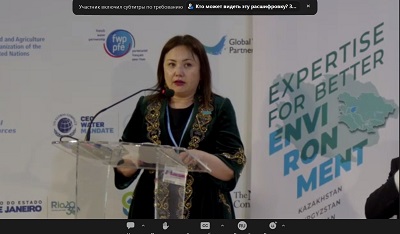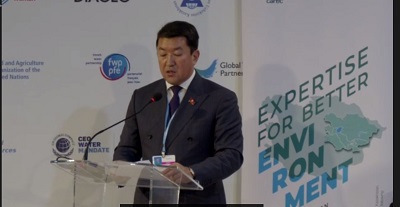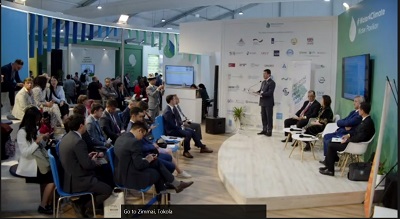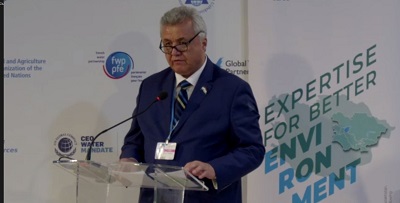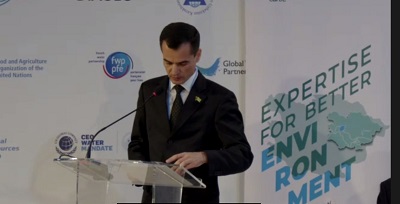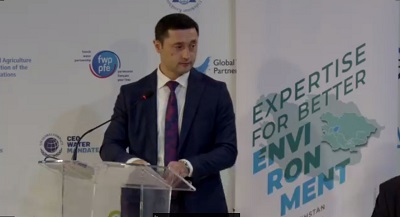The 27th Conference of the Parties to the UN Framework Convention on Climate Change (UNFCCC COP 27) completed its work in Sharm el-Sheikh.
At this global summit, climate finance and adaptation to climate change were the main issues.
The Global Forum took place in Sharm el-Sheikh (Egypt) on November 8 -18, 2022. The summit program included official negotiations, meetings and statements of high-ranking officials, as well as a number of informal events of scientific and public organizations.
Opening the conference, UN Secretary-General António Guterres said that climate change is developing at a "catastrophic rate", and called on countries to strengthen efforts to combat climate change by concluding an additional "climate solidarity pact" on new efforts to keep global warming within 1.5 ° C.
On the sidelines of the global climate summit, a mechanism to finance compensation for losses and damages caused by climate disasters was formed.
This mechanism will compensate for losses and damages to the states most vulnerable to climate disasters and least responsible for climate change.
“The countries of Central Asia - Kazakhstan, Kyrgyzstan, Tajikistan, Turkmenistan and Uzbekistan, because of the particularities of their geographical location, the remoteness from the oceans and seas, and aridity, are extremely vulnerable to global climate change. The areas of the Central Asian countries are exposed to the higher negative impact of climate change than other regions of the world. Climate change in the Central Asian region strengthens the shortage of water resources, the melting of glaciers and desertification processes. Therefore, the countries of the Central Asian region can also become part of the mechanism recently created at UNFCCC COP 27 to compensate for losses and damage caused by climate disasters,” - emphasized Irina Bekmirzaeva, CAREC coordinator for preparation for UNFCCC COP 27, Climate Change and Sustainable Energy Program manager/CAMP4ASB project coordinator.
However, a more detailed development of the financing of this mechanism will be the subject of further discussions within the framework of UNFCCC.
According to many international experts, the COP 27 participants have not yet reached consensus on a number of key issues related to the causes of global warming, including phasing out fossil fuels and toughening language on curbing global warming at 1.5 degrees Celsius.
In this regard, the case of the Central Asian countries is interesting, as the governments of the region have unanimously declared their intention to make every effort to prevent temperatures from rising above the Paris Agreement's stated indicators.
Specifically, the Voice of Central Asia, a joint regional statement of the Central Asian states articulated during UNFCCC COP-27, reads:
“In accordance with global trends, the Central Asian countries have developed strategies and programs for the transition to a green economy, a rapid development of renewable energy (including the use of "green" hydrogen) and to a significant increase in its share in the energy balance of the countries.
Central Asian states are firmly committed to strengthening international cooperation in combating climate change, and seek to use the best practices and experience of "green" development, aimed at reducing energy and raw material consumption, limiting greenhouse gas emissions, minimizing pollution and waste generation, the conservation and restoration of ecosystems, the adaptation of industries and territories to climate change.
The Central Asian states are ready to contribute to improving the mechanisms for achieving the UN Sustainable Development Goals until 2030.
The Central Asian states will consistently introduce modern environmentally friendly agro-, bio- and water-saving technologies, innovative methods of farming, and ensure food security.
The Central Asian states will continue to improve national legislation in the areas of public health, environmental protection and the rational use of natural resources, the development and implementation of environmental services, new types of services and entrepreneurship.”.
Download a full text of the Voice of Central Asia Regional Statement.
The Voice of Central Asia regional statement was developed at the initiative of the Central Asian countries on the basis of the dialogue platform of the Foreign Ministries and Parliamentarians of the Central Asian countries.
It is important to note that, as a platform and resource for the interstate and inter-sectoral dialogue among Central Asian countries, the Regional Environmental Center for Central Asia (CAREC) has provided a comprehensive assistance to Foreign Ministries and parliamentarians of Central Asian countries in developing the unified regional statement.
As part of the content of UNFCCC COP27, CAREC organized a series of events uniting Central Asian countries on the significant issues of implementation of the Paris Agreement commitments, transparency of climate action and resource efficiency in the agro-food sector.
Zafar Makhmudov, Executive Director of CAREC, at the Side Event "Towards Regional Coherence and Cooperation of Central Asian Countries in Climate Policy, Finance and the Implementation of Nationally Determined Contributions (NDCs)," said:
“In the last 20 years, CAREC has earned a reputation of a regional organization that actively supports regional dialogues on the sustainable development, IWRM, adaptation to the negative effects of climate change, the transparency of climate action, climate investment, the coordinated participation in UNFCCC COP, the water and climate cooperation and education ".
According to Sulton Rakhimzoda, Chairman of the Executive Committee of the International Fund for Saving the Aral Sea (EC IFAS), in the context of addressing the challenges of climate change it is necessary to "take all measures to fulfill the obligations assumed under the Paris Agreement, including implementation of the nationally determined contributions."
In her speech, Aizhan Skakova, member of the Committee on Ecology and Nature Management of the Majilis of the Parliament of the Republic of Kazakhstan, said that Kazakhstan is the only Central Asian country where the Green Finance Center of the Astana International Financial Center, responsible for the introduction of the green financial instruments in Kazakhstan and Central Asia, promotion of AIFC as a green finance hub, and attraction of green investments to Kazakhstan was set up, and launched its work.
Nurbek Alimbekov, a member of the "Mekenchil" group of the Committee on Agrarian Policy, Water Resources, Ecology and Regional Development of the Jogorku Kenesh, noted that Kyrgyzstan is ready to achieve carbon neutrality by 2050 and renewable energy sources (RES) will be a driving force in achieving this goal, with an emphasis on hydropower.
Muhammadrahim Yusufi, Chairman of the Environmental Commission, Member of the Committee on International Affairs of the Majlisi Namoyandagon of the Majlisi Oli of the Republic of Tajikistan, emphasized that the ongoing initiatives of President Emomali Rahmon on the water issue over the last two decades, and his participation in the opening ceremony of the National Pavilion of the Republic of Tajikistan within UNFCCC COP-27 demonstrates a positive attitude of the republic to the ratification of the Convention.
Azat Seydibaev, Chairman of the Committee on Environmental Protection, Nature Management and Agro-Industrial Complex of the Mejlis of Turkmenistan, said: "Supporting the efforts of the international community to reduce greenhouse gas emissions, Turkmenistan is switching to the use of modern environmentally friendly and resource-saving technologies, especially in the oil and gas, energy and transport industries».
Boriy Alikhanov, Chairman of the Committee for the Development of the Aral Sea Region, Senator of the Oliy Majlis of the Republic of Uzbekistan, underscored: Uzbekistan demonstrates through practical actions its commitment to fulfilling its obligations to reduce greenhouse gas emissions by 2030 under the Paris Agreement. According to the International Energy Agency, Uzbekistan's carbon dioxide emissions from fuel burning have decreased to 85 million tons. According to the calculations of experts of the Agency, even though it is predicted that by 2030 the greenhouse gas emissions will increase to 60% of the current level, nevertheless, owing to the high rate of economic development and rapid growth of GDP, the republic will exceed the 10 percent reduction in the carbon intensity of GDP by 2030, which corresponds to the commitments made by Uzbekistan.”
In accordance with its mandate to create dialogue platforms to discuss critical climate issues at all levels of society, CAREC is actively working to strengthen a regional cooperation. In this regard, the CAREC side event at COP27 on "Regional Cooperation On Climate Action Transparency" is illustrative.
The side event was dedicated to the possibilities of building sustainable and comprehensive climate action transparency systems, the support of climate information distribution and involvement of stakeholders in the issues of adaptation, climate change mitigation and regional cooperation, the presentation of the project implementation plan on climate action transparency and the main gaps, needs and barriers in this area, dissemination of transparency tools and guidance (such as tools and methodologies of the Initiative for Climate Action Transparency (ICAT) and promotion of their use in the Central Asian region. The second half of the side event was devoted to the role of the civil sector in combating climate change and its consequences, and a statement of the civil sector of the countries of Central Asia “Address of the Central Asia's NGOs on the climate change issues" was heard.
In its regional statement, the Civil Society of Central Asia, urges the governments of Kazakhstan, Kyrgyzstan, Tajikistan, Turkmenistan and Uzbekistan, the UN, the EU, the international and business communities to “revise and significantly strengthen the national and regional climate commitments!”
Representatives of the civil sector of Central Asia believe:
“In order to prevent the climate crisis and negative consequences in Central Asia, emissions must be reduced by at least 30% by 2030 and reach zero balance by 2050. However, the commitments proposed by the Central Asian countries are not enough. The difficulty of achieving the carbon neutrality, when considered in detail, is not so significant, but the social and economic benefits of reducing emissions and adaptation for the human health, employment, and national economies are obvious!"
Read a full text of the regional statement of CA NGOs
On November 11, 2022, Egypt announced at UNFCCC COP 27 the launch of the Food and Agriculture for Sustainable Transformation (FAST) initiative. This initiative aims to qualitatively and quantitatively increase the contribution of climate finance to the transformation of agriculture and food systems by 2030.
The introduction of such initiatives on the sidelines of the global climate summit highlights the importance of adapting agriculture to climate change. In this context, it is especially important to note that work of this kind is already being done in the countries of Central Asia. This was announced of the CAREC side event on "Central Asian Experience: Resource Efficiency in Agri-Food Production and Processing. Here, CAREC initiatives in the field of resource efficiency in agri-food production and processing in the Central Asian region were showcased. Participants received detailed information on how the implementation of sustainable consumption and production (SCP) practices positively affects the productivity of micro, small and medium enterprises (MSMEs) in Uzbekistan and Tajikistan.
COP 27 in Sharm el-Sheikh discussed climate finance and investment for developing countries, which will help increase knowledge on climate and food security, as well as promote policy dialogue. The Food and Agriculture Organization (FAO) will be the coordinator of this initiative. According to Irina Bekmirzaeva, CAREC coordinator for the preparations for UNFCCC COP 27, this area is also of great interest to the countries of Central Asia, which can actively participate in this initiative.
“The main point of the initiative is to recognize that agriculture is an integral part of efforts to overcome the climate crisis”, said Zituni Uld-Dada, deputy director of FAO's Climate and Environment Division, to the UN News Service.
Since the climate change issues are long-term in nature, participation of young people is essential. In the future, a new generation of ecologists, experts, and specialized professionals will have to deal with the effects of climate change and find effective adaptation measures.
Young leaders of Central Asia at the side event "Young leaders of Central Asia on the way to carbon neutrality - implementation of the decisions of UNFCCC COP-26" presented a regional statement of the youth of Central Asia to the participants of the 27th Conference of the Parties to UNCCC COP27.
The youth has called "to ensure that voices of the young climate and water experts are heard, and to support their interests through their meaningful participation in the national, regional, and international processes to shape and implement the climate and water agenda and commitments."
Read a full text of the Regional Statement
The CA Regional Youth Statement is a showcase that various youth networks and groups are willing to cooperate, work together, and develop common messages and solutions. The statement was also made at the international side event "Activation of youth actions for climate and water protection".
Participants of the side event saw the power of the voice of the youth of Central Asia, and how unified it is, and how important to help build capacity of young leaders today.
"Summarizing the results of the UNFCCC COP 27 in Egypt, we can declare with confidence that Central Asian countries have achieved certain successes. I would like to emphasize again that the governments, civil sector and youth of the Central Asian region take a single stand on climate change," concluded Irina Bekmirzaeva, coordinator of CAREC on preparation for UNFCCC COP27.
